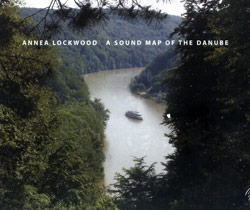
I suppose the single most frustrating aspect of this three disc, 167-minute work, a portrait in sound of the Danube River, is that it neither suggests the immense breadth and mass of the waterway nor, really, the untold billions of small details that, together, serve as irreplaceable atoms in the whole. Rather, it occupies a kind of middle ground, both in the choices that Lockwood makes to represent the world as she travels downstream toward the Black Sea and in the sonic character of the piece itself. One rarely feels either overwhelmed or sucked into an aural vortex; the effect in toto is more that of a slideshow.
Lockwood, as she had done some decades prior in a similar project with the Hudson River as subject, made her way down the length of the Danube, from the Black Forest in Germany, through Austria, Slovakia, Hungary, Serbia, Romania, Bulgaria and finally to the delta in the Ukraine, recording as she went the natural sounds of the river and its surrounding wildlife (natural and urban) and the somewhat less wild conversations of people, in various languages, she encountered along the way. These speaking roles surface regularly, morose or happy, musing or declarative. Translations are provided in the accompanying insert, on the reverse side of which is a fine map of the river, with stopping points noted. That regularity is echoed in the sounds which don't vary overmuch for the duration, including multitudes of insects and birds as well as the odd flock of sheep, revving motor or bells from a village church. Occasionally, as when those peals drift into confluence with water sounds and speech, a lovely kind of "music" emerges, the elements experienced on equal footing, each complementing the other. More often, though, the sounds seem episodic, even when presented, as is normally the case, in layers of two or three. They seem, ironically, shallow. The most common "type" of water sound heard has an oddly interior aspect, as though someone is pouring from one vessel into another. At the same time its recorded presence isn't as illusionist as one might expect; there's not a great deal of depth. So you experience it as a kind of cartoon or line drawing which, at least to this listener, is at odds with what one thinks of as a vast, if sluggish, river, tons of matter streaming by.
This is not to say that the journey is unenjoyable. The general tone is relaxing; we're on a steadily poled raft here, not a motorboat, on which one can read the conversational text as you drift. There's almost always a sense of morning mist in play, of indistinct surroundings which, if one accommodates oneself to it, is fine. But if you hanker for a bit more acuity, a more sharply limned sonic world more poetically approached, better to search elsewhere (like, perhaps, Toshida Tsunoda). As Lockwood stands on the Sfântu Gheorghe Arm of the delta overlooking the Black Sea, water lapping at the shore, the language having changed from German almost 1,800 miles ago to Ukrainian, she can take credit for documenting a long, picturesque journey, albeit one that's already blurring in the memory.
Comments and Feedback:
|



